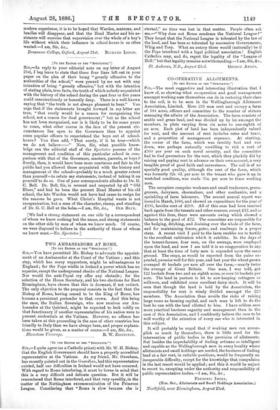CO-OPERATIVE ALLOTMENTS.
[To THE EDITOR OF TEE " SrEctaron."] SIR,—The most suggestive and interesting illustration that I know of, as showing what co-operation and good management amongst working men themselves can do in restoring their class to the soil, is to be seen in the Wellingborough Allotment Association, Limited. Here 223 men rent and occupy a farm of 184 acres, officers and committee to the number of sixteen managing the affairs of the Association. The farm consists of arable and grass land, and was divided up by lot amongst the members, in plots varying from six acres to one-eighth of an acre. Each plot of land has been independently valued for rent, and the amount of rent includes rates and taxes, and a proportion of management expenses. At starting, the owner of the farm, which was terribly foul and run down, was perhaps naturally unwilling to risk a rent of £300 per year on such novel security, and the committee had to find guarantors for the rent, which they pluckily did by raising and paying rent in advance on their own account, a very tangible proof of good faith and earnestness. The soil is of no specially good quality, although the rent of the farm, which was formerly 32s. 6d. per acre to the tenant who gave it up in wretched condition, was made 35s. per acre to these working men.
The occupiers comprise workmen and small tradesmen, green- grocers, dairymen, shoemakers, and other mechanics, and a sprinkling of farm labourers. The second annual report was issued in March, 1886, and showed an expenditure for the year of £195, besides rent of 2299. All of this sum had been received back again from the tenants and other sources, except £12. and as against this item, there were amounts owing which showed a balance to the good of £72. The committee are responsible for the hedging, ditching, and draining over the whole of the farm, and for maintaining fences, gates, and roadways in a proper state. A recent visit I paid to the farm enables me to testify to the excellent cultivation which it exhibits. In the days of the tenant-farmer, four men, on the average, were employed upon the land, and now I am told it is no exaggeration to say that at least the time of forty men is expended upon the same ground. The crops, as would be expected from the pains ex- pended, promise well for this year, and last year the wheat grown averaged 48 bushels per acre all over the farm,—nearly twice the average of Great Britain. One man, I was told, got 122 bushels from two and an eighth acres, or over 56 bushels per acre. The land in pasture is let to cow-keeping cottagers or milkmen, and exhibited some excellent dairy stock. It will be seen that though the land is held by the Association, the responsibility for rent is wisely divided amongst the 223 members. The Association thus avoids the risks of raising large sums as farming capital, and each man is left to do the beet he can with the land allotted to him. I have seldom seen more practical business sagacity and management than in the ease of this Association, and I confidently believe the case to be well worthy of the attention of every one who is interested in this subject.
It will probably be urged that if working men can accom- plish so much by themselves, there is little need for the intervention of public bodies in the provision of allotments. But besides the improbability of finding artisans so intelligent and capable as the Wellingborough men in every locality where allotments and small holdings are needed, the business of finding land at a fair rent, in suitable positions, would be frequently an insuperable difficulty, except for the knowledge that compulsion in the last resort would be applied ; and this it would be unjust to resort to, excepting under the authority and responsibility of public representative bodies.—I am, Sir, &c , FREDERIC TWEE, (Hon. Sec., Allotments and Small Holdings Association.)
Northfield, near Birmingham, August 23rd.


































 Previous page
Previous page